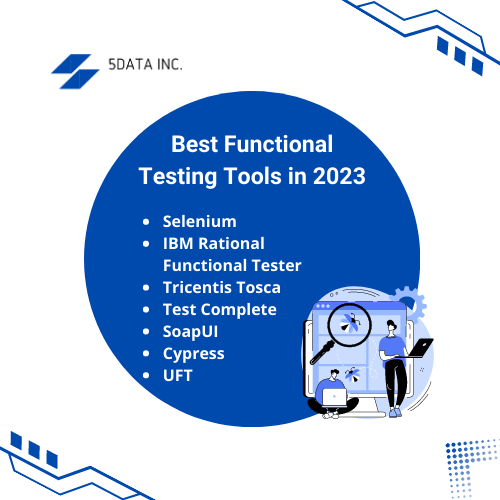It is regarded as black box testing because the internal program structure and code are not assessed; instead, it checks if a certain input produces the desired output in the user interface (UI).
Functional testing tools are similar to automation testing tools and use their capabilities to boost productivity and reduce human error by automating testing scenarios and validating findings. These technologies facilitate bug fixing and resolution by offering insights into the root causes of testing problems. Now, let us know in detail what functional testing is and the best functional testing tools that are often used for software testing.
What Is Functional Testing?
Functional testing is a form of software testing that verifies a software system against functional specifications and requirements. Testing is done by feeding sample inputs, collecting the results, and confirming that the results match the expected output.
DevOps and Quality Assurance teams often utilize functional testing tools to ensure that software works as intended and complies with the requirements and specifications of an application. These tools often use automated test scripts to verify software’s functional and non-functional components.
List Of Best Functional Testing Tools In 2023
Suppose you’re currently testing an application and wish to go faster and catch fewer mistakes. In that case, you can automate the testing process with the best automated functional testing tools mentioned below. These tools aid in complete software development, test management, and performance testing.
1. Selenium
The most well-known open-source automation testing tool for web applications is Selenium. Selenium, created in the 2000s and developed over a decade, has long been a preferred automation framework for Web automation testers, particularly those with significant programming and scripting abilities.
Selenium is a collection of tools such as Selenium IDE, Selenium WebDriver, and Selenium Grid that perform various tasks. Other open-source test automation tools such as Robot Framework, Watir, Katalon Studio, and Protractor have all used Selenium as their primary framework.
Features:
- It supports various browsers (Chrome, Firefox, and IE) and operating systems (Windows, Mac, and Linux).
- Its scripts may be created in various programming languages (Java, Groovy, Python, C#, PHP, Ruby, and Perl).
2. IBM Rational Functional Tester
One of the most popular tools for automated testing is IBM Rational Functional Tester. This tool gives a structure for managing defects that links each test to its corresponding document. The test scripts can be written in either Java or Dotnet. Rational Functional Tester may also be used for functional and regression testing.
Features:
- Numerous applications are supported, including SAP, Ajax, and PDF files.
- The product comes with excellent documentation and a 30-day trial period.

3. Tricentis Tosca
This functional tool is effective for end-to-end testing if you need a test automation platform. It is an AI-powered and codeless automation testing platform that employs an agile approach.
It creates simple test cases for anybody to comprehend since they are written in a common, commercial language rather than a particular program language. As a result, the test cases are created more quickly and may be used for both manual and automated tests. Its technique is highly effective at handling tests that often vary over the sprint cycles.
Features:
- Highly effective model built using the Agile methodology.
- It can take on the greatest business-related risks.
- Non-technical individuals may easily maintain it.
4. TestComplete
TestComplete by SmartBear is packaged commercial testing tool that is cloud-based. It offers functional tests for web, mobile, and desktop testing. TestComplete’s GUI object recognition functionality, which can automatically recognize and update UI items, makes it easier to maintain test scripts when the AUT is modified. Additionally, it incorporates Jenkins into a CI workflow.
Features:
- It supports several scripting languages such as JavaScript, DelphiScript, Python, C++Script, C#Script, VBScript, and JScript.
- It supports several testing methodologies, such as distributed testing, keyword-driven testing, data-driven testing, and regression testing.
- It provides inexperienced testers with a record and playback capability to create and execute functional UI tests.
5. SoapUI
Nowadays, SoapUI is gaining recognition as a remarkable open-source functional testing tool. It is a cross-platform tool that works with Eclipse and NetBeans IDEs. Also, service-oriented architectures and REST services are compatible with it. Other than testing, it may be used for code mocks, examination, and development. Plus its other uses are load testing, compliance, and security testing.
Features:
- Basic data-driven testing.
- Both non-technical and technical uses are possible for it.
- Quickly develops load tests based on existing functional API tests.
- It offers simple reporting features that can also be transferred into Excel.
6. Cypress
Cypress is a JavaScript-based end-to-end testing framework for web-based applications. It is designed to make it easier to write and run tests for web applications, allowing developers to test the behavior of their applications from the user’s perspective. Cypress, which uses Mocha as its foundation, focuses on resolving delays and time problems in Selenium WebDriver.
Features:
- Time-travel debugging, automatic waiting, and real-time reloading make writing, debugging, and maintaining tests easier.
- It integrates seamlessly with continuous integration (CI) and continuous delivery (CD) workflows.
- Can run functional test scripts easily and quickly and record the results on the cloud.
- Allows cross-browser testing on Firefox, Edge, and Electron browsers.
- Parallel test execution
7. UFT (Unified Functional Testing)
UFT was originally known as the HP QuickTest Professional testing tool or QTP. It combines Micro Focus Service Test (API testing tool) and Micro Focus QTP (GUI testing tool). It offers a full feature set for web services and API testing of desktop, mobile, and web application testing across platforms. Visual Basic scripting is used in UFT to register and execute test processes on the different objects and controls for the software application being tested.
Features:
- Unique smart object recognition.
- Built-in method for managing errors.
- It utilizes the scripting language for a test procedure.
- Simple integration with other solutions like Mercury Quality Center and Mercury Business Process Testing.
- Simple to set parameters for checkpoints, data-driven tables, and objects.
Get Started With Automated Functional Testing With 5Data Inc.
The automated functional testing services from 5Data Inc. ensures that software applications are verified and validated by giving customers and businesses solid functional coverage using a special methodology and procedure.
The key focus at 5 DATA INC is always domain awareness, and we use automation tools like Selenium. And to achieve broader coverage of the scenarios, we use Agile, Waterfall, and Incremental models. So, why wait? Contact our experts and explore the best automated functional testing services 5Data Inc. provides.

Bishnupriya Pradhan
Author
